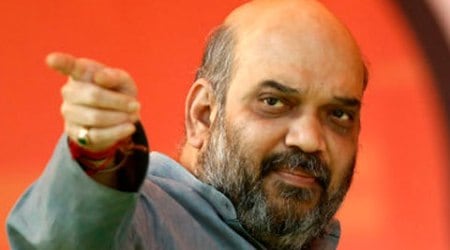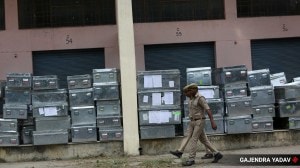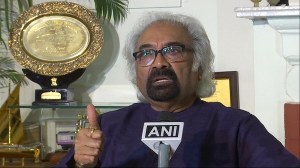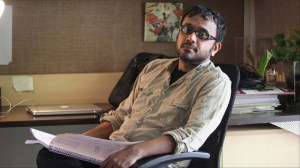- India
- International
Amit Shah, high command
Amit Shah is also the president of the Gujarat Chess Association, which deals with his favourite game.
 Those close to Shah, 49, describe him as someone who never loses his temper or raises his voice in public.
Those close to Shah, 49, describe him as someone who never loses his temper or raises his voice in public.
The rise of Modi’s longtime aide from grassroots manager to Gujarat minister to BJP national president
It was a few days to the Jagannath Rath Yatra in July 2010. Amit Shah, then minister of state for home, prohibition, law, parliamentary affairs, transport and civil aviation in Narendra Modi’s government in Gujarat, was at the Ahmedabad circuit house, meeting friends and party men, days before the CBI was to arrest him in the Sohrabuddin Sheikh fake encounter case. “He did not look disturbed. In fact he narrated the whole story of Guru Ram Das (the fourth Sikh guru) to me,” says one of those who met him that day.
Those close to Shah, 49, describe him as someone who “never loses his temper or raises his voice in public”. The BJP’s youngest national president is, sources say, the only one after Atal Bihari Vajpayee and L K Advani to have made it to this position without caste or community backing and without having held a prominent political office in either the BJP or the RSS.
When he filed his affidavit before the Election Commission, Shah declared himself a “second year BSc from Gujarat College, Gujarat University” and that he “does not have an email id”. He got on to Twitter after he was appointed BJP general secretary in charge of UP, and now has 200,000 followers. He is also on Facebook. His tweets include tributes to martyrs, homage to heroes in history, links to media coverage on him and congratulatory messages to his party, and Modi. He rarely posts an opinion. One post of May 13, 2014, from an interview he gave a television channel, says, “I don’t have dual personality, just a single image of hardworking grassroot level General Secretary of BJP”.
Everyone in the BJP concurs that Shah has only one master, Modi, that Shah is the only one who can say “no” to Modi and that he would listen. They joined the BJP around the same time, in 1987, though Shah first met Modi earlier that decade in one of the RSS shakhas he frequented as a teenager. In the BJP, he started out as in-charge of the ABVP, its student wing.
The Gujarat years

Born in 1964 in Mumbai, Shah is the son of a businessman in PVC pipes, a trade Shah dabbled in after college. He also worked as a stockbroker. He is said to have acquired his management skills from his grandfather Gokuldas, who was an administrator in the princely state of Mansa under the Gaekwads in north Gujarat. In the BJP he steadily rose to ward in-charge, taluka president and general secretary.
In 1997, when Shah won Sarkhej constituency in a byelection with a thumping 56.1 per cent of the votes, it infused new life into the BJP, which had lost power to a coup by Shankersinh Vaghela. Before that the BJP had been losing byelections and steadily losing ground in Gujarat.
BJP leaders maintain even today that had they lost Sarkhej, a BJP bastion, they would have faced an exodus just before the 1997 budget session. Sarkhej is dominated by Patels and OBCs and Shah is a Vaishnav. His victory helped the BJP prove that while infighting had cost it power, it still had the people behind it. The party regrouped and returned to power in 1998.
“Young and energetic Shah was the trump card of the BJP,” says party spokesperson Harshad Patel, referring to that election.
Those close to Shah also cite his understanding of the cooperative sector. In 1995 he became director and chairman in 1999 of the Ahmedabad District Cooperative Bank. “When the Madhavpura Mercantile Cooperative Bank collapsed, he persuaded then union finance minister Yashwant Sinha to revive it. He said that if this bank goes, then the BJP goes from Gujarat,” says a colleague in the BJP.
After Modi became chief minister, Shah’s efforts ended former Congress strongman Narhari Amin’s hold in the cooperative banking sector and cricket administration, with Modi being elected the Gujarat Cricket Association (GCA) president. The last election saw Shah succeeding Modi. Shah’s son Jay, an engineer from Nirma University, is joint secretary of the GCA. Amit Shah is also the president of the Gujarat Chess Association, which deals with his favourite game.
A BJP leader says, “Modi kept Shah waiting in the wings until the time was right, and did not make him a minister in his first government.” After the BJP won a thumping majority in 2002, Shah was given 10 portfolios, topped by home. It is during his tenure as home and law minister that the controversial Gujarat Control of Organised Crime Bill and Gujarat Freedom of Religion Act to prevent forced conversion were introduced.
This period also saw the CBI chargesheeting him for the killings of Sohrabuddin Sheikh and his wife Kauser Bi, and of Tulsiram Prajapati in allegedly staged encounters. Shah was arrested and lodged in Sabarmati Jail for three months from July 2010 after which the Supreme Court granted him bail but kept him out of Gujarat, a restriction later lifted. The two cases were clubbed and are being tried in a Mumbai court, which recently exempted Shah from appearing.
Then and now
When Modi was exiled from Gujarat as general secretary in Keshubhai’s time, Shah was like his “eyes and ears” in the state, says a senior party leader. “And if Advani has won Gandhinagar with impressive leads since 1991, it has been due to Shah’s organisational skills.”
Which is why Modi wanted the grassroots networker for the UP assignment. A Delhi-based BJP national executive camping in Varanasi in May had told this paper, “In my 12 years in the BJP, I have been to many meetings, but in two meetings held by Amit Shah , I learnt more than I had learnt in all these years . There is no comparison to his organisational skills, or to his understanding of how you work for an election. I have kept those notes as a Bible.”
On May 21, 2014, at the function to declare Anandiben Patel his successor in Gujarat, Modi told party workers at Town Hall in Gandhinagar how he and Shah had turned adversity into opportunity.
“In 1995, because of internal strife in our party I had to leave Gujarat. The Congressmen were very happy, so happy… haish (an expression of relief)… The same thing they did to Amitbhai. Look what the CBI set out to do, and look what happened! Now if they see Amitbhai’s photo… They had no idea that if a man sets out with a mission, he can accomplish anything.”
Sohrabuddin Sheikh encounter
Amit Shah is accused No 16 in the CBI chargesheet for the murder of Sohrabuddin and his wife in an encounter allegedly faked. Charged under sections for conspiracy, murder, abduction, wrongful confinement and others, Shah was jailed for three months in 2010. Case pending with Mumbai CBI special court, which recently exempted him from appearing.
Tulsiram Prajapati encounter
Accused No. 1 in the CBI chargesheet as a conspirator in the killing of Tulsiram Prajapati, again in an allegedly staged police encounter. Charged under sections for conspiracy read with those for murder, destruction of evidence, kidnapping and others. Case clubbed with the Sohrabuddin one as directed by Supreme Court and transferred to the Mumbai court.
Snooping on behalf of ‘saheb’
A commission of inquiry has been set up by the Gujarat government to probe tapes aired by two news portals that alleged that Amit Shah ordered snooping on a young woman architect at the behest of a “Saheb” using the police network when he was MoS (home) in 2009. The Sugnya Bhatt Commission appointed for the inquiry recently got a three-month extension.
Apr 24: Latest News
- 01
- 02
- 03
- 04
- 05







































